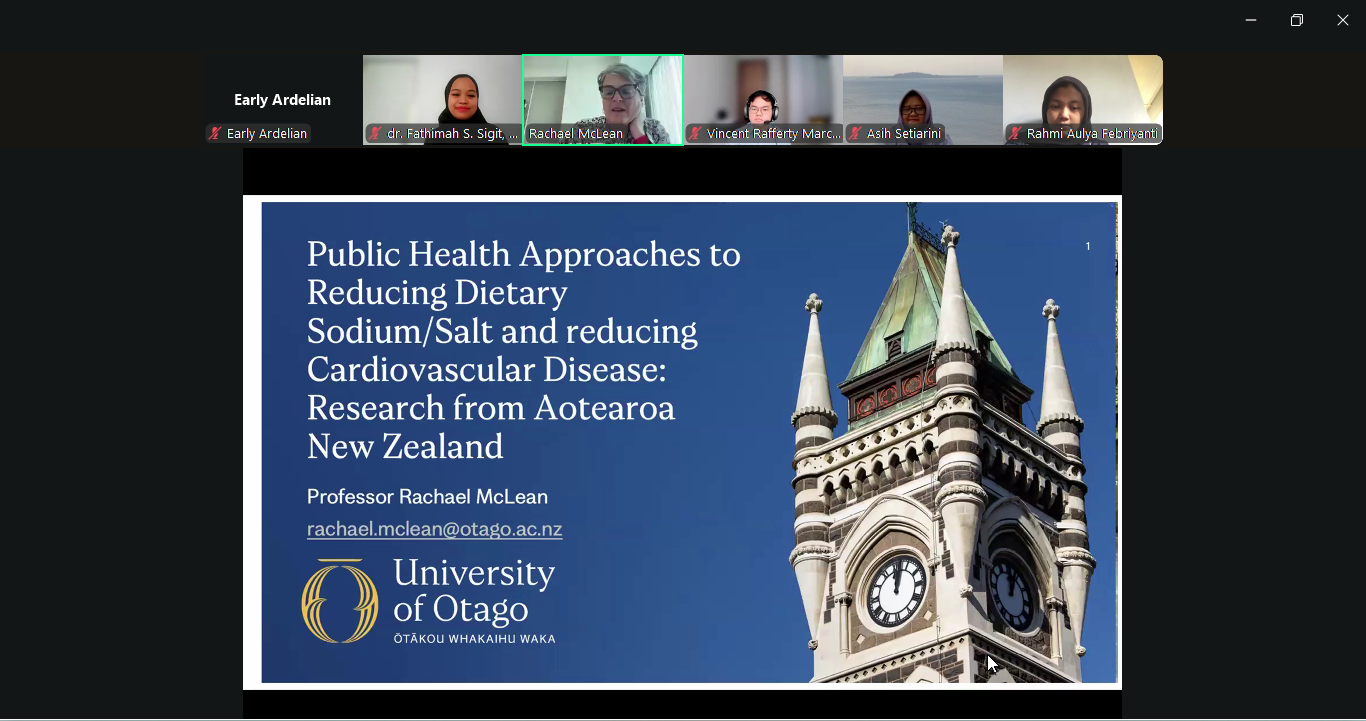Depok, September 1, 2025 – The Faculty of Public Health (FPH) Universitas Indonesia (UI) once again reaffirmed its commitment to expanding international academic networks and enriching the perspectives of its academic community through a public lecture titled “Public Health Approaches to Reducing Dietary Sodium or Salt and Reducing Cardiovascular Disease: Research from Aotearoa, New Zealand.”
The online lecture, held via Zoom Meeting, was integrated into the Introduction to Public Health course for first-semester undergraduate students. The event was opened by the Vice Dean for Education, Research, and Student Affairs of FPH UI, Dr. Ir. Asih Setiarini, M.Sc. In her opening remarks, Dr. Asih emphasized the importance of learning from evidence-based public health strategies in other countries, such as New Zealand, in efforts to reduce sodium intake. “Excessive salt consumption is one of the main causes of hypertension, which then becomes a major risk factor for cardiovascular diseases — the leading cause of death worldwide, including in Indonesia,” said Dr. Asih.
The keynote speaker, Professor Rachel McLean from the University of Otago, New Zealand, explained that cardiovascular diseases, particularly coronary heart disease and stroke, remain the leading causes of death in New Zealand. Mortality risks are even higher among Māori and Pacific peoples compared to the European population, with excessive salt intake being one of the major contributing factors.
Based on her research, the average salt intake among New Zealanders reaches 3,400 mg per day—almost twice the WHO recommendation of 2,000 mg. High-salt diets, according to Prof. McLean, increase the risks of hypertension, diabetes, and obesity—conditions that are also prevalent in Indonesia. She also shared her experience collaborating with international doctoral students, including from Indonesia, in obesity and nutrition research using data from the Indonesian Family Life Survey. “Reducing salt intake is a crucial step to lowering hypertension and heart disease rates. However, the main challenge lies in hidden salts within processed and industrial foods,” explained Prof. McLean.
To address this issue, Prof. McLean introduced WHO’s SHAKE strategy: Surveillance (monitoring salt consumption), Harness Industry (food product reformulation), Adopt Standards (nutrition labeling and regulation), Knowledge (public education), and Environment (creating supportive environments for healthy diets). She stressed that a combination of education, government regulation, industry engagement, and environmental changes is essential to achieving sustainable and widespread healthy eating behaviors.
The discussion session was lively, with students raising various questions—one of which concerned the prevalence of high-salt snacks sold near elementary schools. Prof. McLean underscored the need for community-based interventions and regulations, noting that children’s eating habits are formed early in life. “If children get used to salty foods, it will be difficult to change their eating patterns later. Collaboration between schools, families, and governments is essential to protect them,” she said.
Responding to another question on the effectiveness of regulations, Prof. McLean emphasized that strong public policies tend to be more effective than voluntary approaches. She cited the success of tobacco control regulations, which include nutrition labeling, advertising restrictions, and taxation on unhealthy products.
The lecture’s moderator, dr. Fathimah S. Sigit, M.Res., Ph.D., concluded that although the daily salt intake of Indonesians is still about twice the WHO recommendation, New Zealand’s experience in salt reduction research and strategies provides valuable insights to strengthen health promotion efforts in Indonesia.
Through this public lecture, FPH UI reaffirms its role as an educational institution that brings globally relevant learning experiences aligned with national health challenges, while strengthening international academic collaboration. (EAR)

